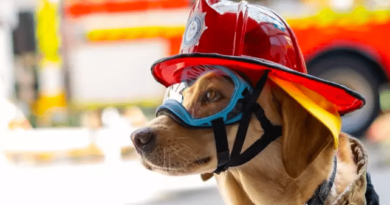Give Dog-Reactive Dogs Some Space
Ready for our daily hike, I had just let my three dogs out of the car when I hear a very deep bark near the trailhead, followed by someone calling a dog’s name. Quickly, I get my dogs back in the car and shut the door.
Down from the trailhead comes an unleashed Mastiff-type mixed breed, barking and running toward a man sitting on his tailgate putting on his hiking boots. By his side is his leashed dog, who’s watching this big dog barrel toward him. The woman yells, “It’s okay, he’s friendly.” The leashed dog is clearly frightened but has nowhere to go; he tries to jump back into the truck, but it’s too late—the bigger dog is barking and jumping on him.
Luckily, nothing happened. While the woman’s dog was friendly, he clearly had no training and no sense of canine etiquette. He didn’t listen to his guardian or to the other dog, whose body language was telling him “I’m not interested.”
Standing by my car in the parking lot, my dogs eager to get on the trail, I wait for the girl to leash up her dog or put him in the car. She does neither, leaving him to wander the parking lot. She sees me watching, and after five minutes or so, says, “What are you staring at?” I tell her I’m waiting for her to take charge of her dog so I can let my dogs out and go for a hike. She says nothing, just keeps doing what she’s doing. I continue to wait and watch.
GET THE BARK IN YOUR INBOX!
Sign up for our newsletter and stay in the know.
Her next comment: “Stop staring at me.” I ask if it bothers her and she says yes, to which I reply, “I’m 50 feet away from you, calmly waiting for you to leash your dog. That bothers you?” Furious now, she says, “Yes! I don’t like people looking at me.”
“Wow,” I say. “Can you imagine what it must feel like to be a dog being charged by your humungous, barking, out-of-control dog?” Giving me a look of disgust, she says nothing more.
This scenario happens somewhere every day. Oddly, the guardians of these ill-mannered, untrained dogs (on-leash or off) think we’re the problem. Their dogs are “friendly” and ours are reactive or aggressive—that’s why they’re leashed, right? Little do they know.
The phrase “my dog is friendly” haunts me and every person with a dog who’s fearful, stressed or anxious around other dogs. Being rushed by an unfamiliar dog is an intrusion, one that can end badly in so many ways. At the very least, it reinforces our dogs’ fears and anxieties and undermines any progress we may be making in helping them overcome their issues. And, based on what I’ve seen, most people who say “my dog is friendly” in reality have little to no control of their dogs.
Dogs can develop some level of fear, anxiety or stress around other dogs for a number of reasons, among them, insufficient socialization as a puppy, having been attacked or bullied by another dog, leash reactivity, and age or disability. Like dogs with physical impairments—blindness, deafness, a missing limb—they are special-needs dogs.
Regardless, they still like to get out and about, and we like to give them opportunities to do so—just at a different pace and style. They’re not leashed because they are untrained; they’re leashed so we can keep them safe. They shouldn’t be condemned nor forced to endure other dogs’ so-called friendly greetings.
Here’s what you can do to help leashed dogs who need space:
•Understand and respect that need.
•Leash or call your dog to you so we can pass with a minimum of fuss.
•If you don’t have voice control, please don’t let your dog off-leash until you do.
•Don’t let your dog crowd the entrance at dog parks.
•Observe leash laws.
Like any dog-lover, those of us with special-needs dogs want our pups to have positive, joyful experiences, but that’s hard to do while worrying about random encounters with off-leash dogs, friendly or not. So, be kind when you’re asked to put your dog on a leash—there’s a reason for the request, and by doing so, you’ll help ease the way for everyone.




